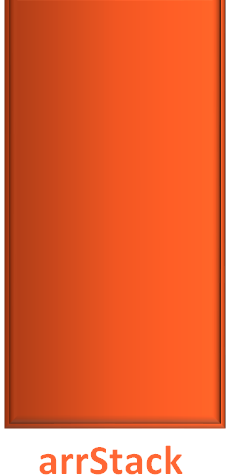

Let us define our own Stack class and define all the methods there.
<html>
<body>
<script>
function push(i) {
if (size() === SIZE) {
document.write("Stack Overflow </br>")
return false
}
else {
stackArray.push(i)
return true
}
}
function pop() {
var element = 0
if (isEmpty()) {
document.write("Stack is Empty </br>")
return -1
}
else {
element = stackArray.pop()
document.write("The element ",element," is popped out of the Stack </br>")
return element
}
}
function topElement() {
if (isEmpty()) {
document.write("Stack is Empty </br>")
return -1
}
else {
document.write("The top element is ",stackArray[stackArray.length-1], "</br>")
return stackArray[stackArray.length-1]
}
}
function size() {
return stackArray.length
}
function isEmpty() {
return (stackArray.length < 0)
}
var SIZE = 10
var stackArray = []
push(10)
push(20)
push(30)
topElement()
pop()
pop()
pop()
</script>
</body>
</html>
As we know the most important operations/methods of Stack are Push and Pop. However, there are other methods that we will be using here.
So, we have the below methods :
So, at first, we define the array where we will be storing the elements of the Stack.
stackArray = []
Also, we have defined a constant called SIZE where we have defined the size of the array.
SIZE = 10
Now, let us go to the main program and see the Stack in action.
So, initially we have an empty Stack.

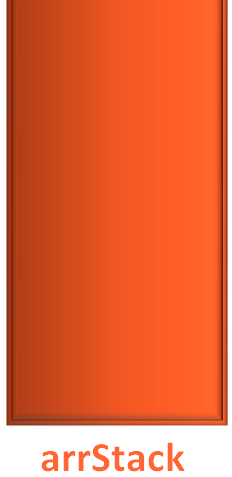
Then we try to push the element 10 into the Stack
push(10)
So, the push() method is called,
function push(i) {
if (size() === SIZE) {
document.write("Stack Overflow </br>")
return false
}
else {
stackArray.push(i)
return true
}
}Now, the push() method calls the size() method to check the size of the Array.
function size() {
return stackArray.length
}The size() method returns stackArray.length.
So, size() method returns size of the array i.e. 0.
So, we are back in the push() method with the value 0 returned from size() method.
Now, in the if statement, we find the condition,
if (size() == SIZE)
But in this case size() returned 0 and SIZE is initialised with 10.
So, we come to the else part,
else {
stackArray.push(i)
return true
}Inserts the element 10(As i is 10) to the 0th location of the Array stackArray.

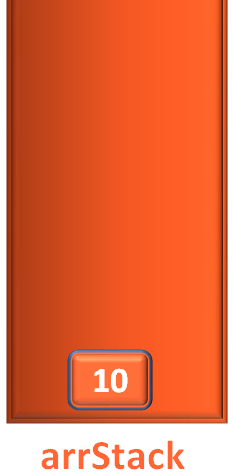
Then we try inserting the element 20 using the push(...) method again.
push(20)
Similarly, push(...) method is called,
function push(i) {
if (size() === SIZE) {
document.write("Stack Overflow </br>")
return false
}
else {
stackArray.push(i)
return true
}
}Now the value of i is 20.
Same way as above, the if condition checks, if the total number of elements in the array(Determined by the size() method) is equal to the size of the array.
In this case the total number of elements in the array is just one i.e. 10(And we are going to insert 20). And the size of the array is 10.
So, we come to the else part.
else {
stackArray.push(i)
return true
}And 20 gets inserted into the stack. And just remember 20 is the top element now.

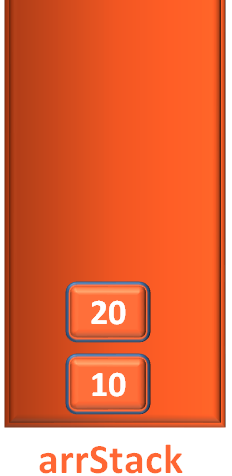
After that, we try inserting the element 30 using the push(...) method again.
push(30)
And, as usual, push(...) method is called and the element 30 is inserted into the Stack.

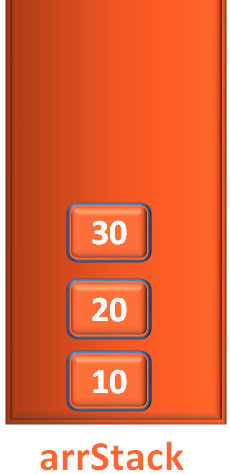
Next, we try getting the top element of the stack by calling the topElement(..) mkethod.
topElement()
And as we know the variable tp always points to the top element. So, if we could get the value of the variable tp, we could get the top element.
And exactly, the same thing is done in the top() method.
function topElement() {
if (isEmpty()) {
document.write("Stack is Empty </br>")
return -1
}
else {
document.write("The top element is ",stackArray[stackArray.length-1], "</br>")
return stackArray[stackArray.length-1]
}
}In the topElement() method, we check if the array is empty or not.
if (isEmpty()) {
document.write("Stack is Empty </br>")
return -1
}And if the array is not empty, we come to the else part. Where the value of the top position is returned.
return stackArray[stackArray.length-1]
So, stackArray[stackArray.length-1] would return 30 as the top element.

Next, we try popping the elements from the Stack. One at a time.
So, when we run the first pop() method.
pop()
The pop() method is called.
function pop() {
var element = 0
if (isEmpty()) {
document.write("Stack is Empty </br>")
return -1
}
else {
element = stackArray.pop()
document.write("The element ",element," is popped out of the Stack </br>")
return element
}
}So, as usual we check if the array is empty or not.
if (isEmpty()) {
document.write("Stack is Empty </br>")
return -1
}Now, if the array is not empty, we come to the else part.
else {
element = stackArray.pop()
document.write("The element ",element," is popped out of the Stack </br>")
return element
}The operation is quite simple,
We take the current top element in the element variable.
element = stackArray.pop()
i.e.
element = 30.
Then we replace the current top element with 0.

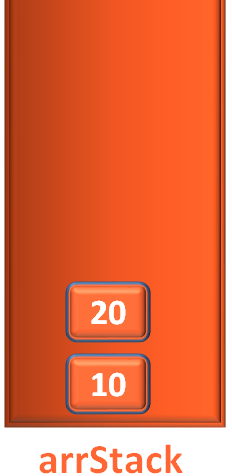
Similarly, after running pop() method twice,
pop() pop()
Both the elements 20 and 10 are popped out of the Stack.
